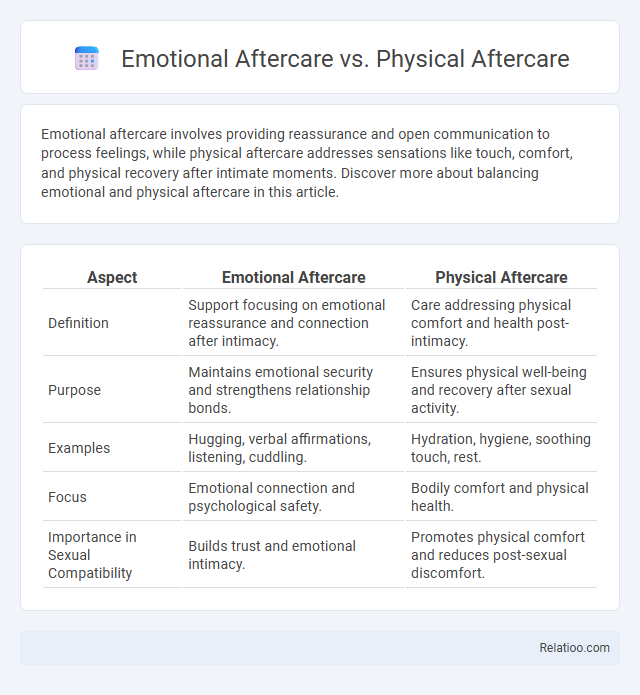Emotional aftercare involves providing reassurance and open communication to process feelings, while physical aftercare addresses sensations like touch, comfort, and physical recovery after intimate moments. Discover more about balancing emotional and physical aftercare in this article.
Table of Comparison
| Aspect | Emotional Aftercare | Physical Aftercare |
|---|---|---|
| Definition | Support focusing on emotional reassurance and connection after intimacy. | Care addressing physical comfort and health post-intimacy. |
| Purpose | Maintains emotional security and strengthens relationship bonds. | Ensures physical well-being and recovery after sexual activity. |
| Examples | Hugging, verbal affirmations, listening, cuddling. | Hydration, hygiene, soothing touch, rest. |
| Focus | Emotional connection and psychological safety. | Bodily comfort and physical health. |
| Importance in Sexual Compatibility | Builds trust and emotional intimacy. | Promotes physical comfort and reduces post-sexual discomfort. |
Understanding Emotional Aftercare
Emotional aftercare involves providing psychological support and reassurance following intense or vulnerable experiences, addressing feelings like anxiety, shame, or overwhelm to promote mental well-being. This contrasts with physical aftercare, which focuses on tending to bodily needs such as wounds, hydration, and rest to ensure physical recovery. Understanding emotional aftercare is crucial for fostering trust and healing, as it helps individuals process emotions, reaffirm boundaries, and restore emotional balance after challenging interactions.
Defining Physical Aftercare
Physical aftercare involves actions taken to support the body's recovery and comfort following intense experiences, such as massages, hydration, and gentle touching to alleviate physical tension or soreness. Emotional aftercare centers on addressing psychological and emotional needs, offering reassurance, conversation, and empathy to foster emotional well-being. While aftercare broadly encompasses both physical and emotional support, physical aftercare specifically targets bodily care to promote healing and relaxation after demanding activities.
Key Differences Between Emotional and Physical Aftercare
Emotional aftercare involves providing support for mental well-being, including reassurance, active listening, and comfort to help process feelings after intense experiences, whereas physical aftercare focuses on addressing bodily needs like hydration, wound care, and pain management. Your emotional aftercare ensures mental recovery and emotional safety, while physical aftercare targets physical healing and comfort. Understanding these key differences allows for comprehensive aftercare that attends both to mind and body effectively.
The Importance of Emotional Aftercare
Emotional aftercare plays a crucial role in the healing process by addressing feelings of vulnerability, anxiety, and emotional distress that may arise after intense experiences, ensuring mental well-being and relationship trust. Physical aftercare, while essential for addressing body care like wound treatment or muscle relaxation, does not fully encompass the psychological recovery needed post-encounter. Comprehensive aftercare integrates both emotional support and physical care to promote holistic healing and reinforce emotional safety.
The Role of Physical Aftercare in Healing
Physical aftercare plays a crucial role in your healing process by addressing the body's immediate needs after intense emotional or physical experiences. This includes practices such as gentle touch, hydration, and rest, which help reduce physiological stress and promote relaxation. While emotional aftercare focuses on mental and emotional support, physical aftercare ensures your body recovers effectively, creating a foundation for overall well-being.
Signs You Need Emotional Aftercare
Signs you need emotional aftercare include persistent feelings of anxiety, sadness, or overwhelm following a traumatic event or intense experience. You might find yourself struggling to process emotions, experiencing mood swings, or feeling disconnected from others. Recognizing these signs is crucial for seeking appropriate support that focuses on mental and emotional healing, distinct from the physical aftercare that addresses bodily recovery.
Signs You Need Physical Aftercare
Physical aftercare involves immediate care to soothe the body after intense physical activity, such as applying ice to bruises or hydrating to replenish fluids, while emotional aftercare focuses on mental reassurance and comfort to address feelings of vulnerability. Signs you need physical aftercare include persistent soreness, unexplained bruising, difficulty moving, or sharp pain that doesn't subside within a reasonable time. Recognizing these indicators can help you differentiate between emotional needs and physical healing requirements, ensuring comprehensive recovery after any demanding experience.
Integrating Emotional and Physical Aftercare
Emotional aftercare involves providing empathy, reassurance, and communication to support psychological well-being following intense experiences, while physical aftercare focuses on addressing bodily needs such as hydration, warmth, and wound care. Integrating emotional and physical aftercare enhances overall recovery by acknowledging the interconnectedness of mind and body, ensuring comprehensive support that promotes healing holistically. This combined approach improves resilience, reduces trauma, and fosters trust and safety in caregiving or intimate dynamics.
Common Misconceptions About Aftercare
Emotional aftercare involves supporting mental and emotional well-being following intense experiences, often misunderstood as secondary to physical aftercare, which focuses on treating bodily needs such as wounds or fatigue. Aftercare as a whole encompasses both emotional and physical care, yet a common misconception is that aftercare is solely about physical recovery, neglecting the critical role of emotional reassurance and communication. Understanding the nuanced differences ensures comprehensive care that promotes holistic healing and long-term well-being.
Tips for Effective Aftercare Practices
Effective aftercare practices encompass emotional aftercare, physical aftercare, and a comprehensive blend of both to promote overall well-being. Emotional aftercare tips include active listening, providing reassurance, and validating feelings to help process intense experiences, while physical aftercare involves hydration, rest, and wound care to support bodily recovery. Combining these approaches by tailoring communication, comfort measures, and practical support ensures holistic healing and strengthens trust in caregiving relationships.

Infographic: Emotional Aftercare vs Physical Aftercare
 relatioo.com
relatioo.com